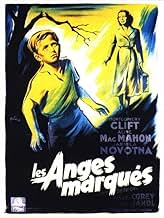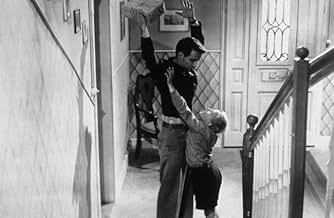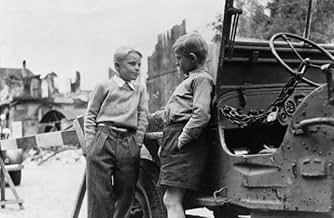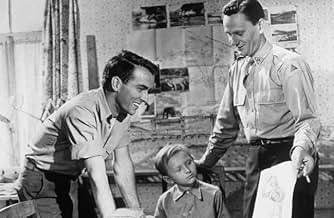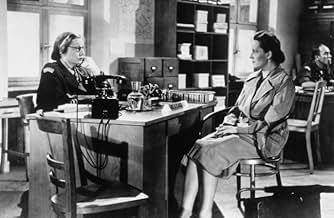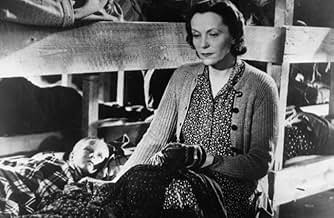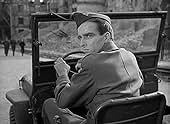CALIFICACIÓN DE IMDb
7.8/10
5.2 k
TU CALIFICACIÓN
En el Berlín de la posguerra, un soldado estadounidense ayuda a un niño checo perdido a encontrar a su madre.En el Berlín de la posguerra, un soldado estadounidense ayuda a un niño checo perdido a encontrar a su madre.En el Berlín de la posguerra, un soldado estadounidense ayuda a un niño checo perdido a encontrar a su madre.
- Dirección
- Guionistas
- Elenco
- Ganó 1 premio Óscar
- 7 premios ganados y 7 nominaciones en total
Opiniones destacadas
MONTGOMERY CLIFT is the nominal star of THE SEARCH but it's little Ivan Jandl that audiences were likely to remember after watching this spellbinding story of his plight as a victim of war amid separation from his mother. Clift is firmly in command of his role as a compassionate soldier who takes the boy under his wing and teaches him to communicate in English. Wendell Corey is excellent as a soldier friend of Clift and opera singer Jarmila Novotna is totally convincing as the boy's mother intent on being reunited with her son.
Another pivotal role is filled brilliantly by ALINE MacMAHON in a part that surely deserved an award nomination. At any rate, Clift deserved his nomination as Best Actor and Ivan Jandl fully deserved his special Oscar as the juvenile lead. His facial expression and eyes tell the whole story without a single bit of dialogue. The only other child actor I can compare him with (at that time) is Claude Jarman, Jr. who showed a natural skill for performing at a tender age.
The impact of the devastation of war on ruined buildings is caught by the camera vividly in on location footage shot in Germany under Fred Zinnemann's expert direction. But it's the impact of war on the very young children that is the focus of this film and to that end it succeeds brilliantly in capturing the grief and loneliness of all those victims of war in a way that is sure to stir your emotions.
Summing up: gritty post-war film, honest emotionally and powerful in its presentation. Highly recommended.
Another pivotal role is filled brilliantly by ALINE MacMAHON in a part that surely deserved an award nomination. At any rate, Clift deserved his nomination as Best Actor and Ivan Jandl fully deserved his special Oscar as the juvenile lead. His facial expression and eyes tell the whole story without a single bit of dialogue. The only other child actor I can compare him with (at that time) is Claude Jarman, Jr. who showed a natural skill for performing at a tender age.
The impact of the devastation of war on ruined buildings is caught by the camera vividly in on location footage shot in Germany under Fred Zinnemann's expert direction. But it's the impact of war on the very young children that is the focus of this film and to that end it succeeds brilliantly in capturing the grief and loneliness of all those victims of war in a way that is sure to stir your emotions.
Summing up: gritty post-war film, honest emotionally and powerful in its presentation. Highly recommended.
I got to this movie randomly in the night program and found it was rather undeservedly relegated to past 11pm duties on TV. For Germans, it may be hard to chew the past concentration camp experiences of Children survivors in English and American orphanages and the highlighted search of a mother for her young boy, from whom she has been separated during the war. Sentimental : Yes Heart Gripping : Yes Wonderful to watch to the (happy ???) ending ? Yes all over. Great performances by the young boy, Ivan Jandl, the mother and the orphanage manager and very convincing performances of Montgomery Clift and Wendell Corey as teachers and father stand ins. I do know the ending, but it grips me nevertheless, even on replay. And if you're not icy to the heart, it will do the same for you.
The Search (1948)
This is a critical film in director Fred Zinnemann's career. After years of doing shorts and B features, and after WWII had ravaged the world, he turned to a subject that must have ripped him up every day he was shooting. The story of orphaned kids, most of the Jewish, in the rubble of post-War Germany.
You see, both his parents were killed by the Nazis in the war. And here he was, a man with roots in documentary film in the 1930s, making real one of the remaining problems recovering from Nazi mess, these displaced children. The black and white filming is gritty and polished at the same time, and much of it is shot on location in the real ruins of Germany in the American sector (in Nuremberg). For that alone it's worth seeing.
By the way, the interior work was done in a Swiss garage—the crew for the whole film consisted of a total of ten Swiss technicians and a truck. Though the movie was an American release, the main producer was Swiss, too. All of these are reasons why it feels different than what Hollywood might have attempted on studios lots, and probably failed at least in authenticity.
Throw in that Montgomery Clift is starring in the lead role and you have another reason to watch. He's really wonderful, already feeling like the mature, charming, disarming young man he is famous for on screen. Be warned however—he doesn't show up until nearly halfway through. The first half of the movie is touching but makes for disappointing drama, forming a quasi-documentary overview of the horrid situation but with a voice-over that means well but makes it almost sentimental instead of tragic. Be sure to stick it out until the real plot kicks in with Clift sitting in a Jeep.
There are other actors here—the mother looking for her child is an opera singer in real life and is more pathetic than persuasive, and the chief nurse, played by Aline MacMahon, is terrific. Still, the movie, and the screen time in the second half, is Clift's, thankfully, and the boy's. This child was discovered while scouting for the movie, apparently, and is a Czech kid names Ivan Jandl. Amazingly, he knew no English when the movie started, and was coached by Clift as they went, very much like happens in the movie. This obviously makes it more convincing top to bottom.
And makes you love Clift even more. He took the role quite seriously, studying (according to a TCM article worth googling) American soldier engineers by living with them, especially trying to get the way they walked. Fascinating details for a movie that depends on its verisimilitude above all.
If there is an inevitable arc to the events, you'll have to live with it. And if some of the acting is average, and some of the plot requiring patience, you'll have to live with that, too. It's not a gem taken whole. But the best of it is remarkable. An absolute must-watch if you like this period, the director, or even this kind of shooting, which has an echo of "Rome Open City" and other European productions shot in the actual remains of Old Europe.
This is a critical film in director Fred Zinnemann's career. After years of doing shorts and B features, and after WWII had ravaged the world, he turned to a subject that must have ripped him up every day he was shooting. The story of orphaned kids, most of the Jewish, in the rubble of post-War Germany.
You see, both his parents were killed by the Nazis in the war. And here he was, a man with roots in documentary film in the 1930s, making real one of the remaining problems recovering from Nazi mess, these displaced children. The black and white filming is gritty and polished at the same time, and much of it is shot on location in the real ruins of Germany in the American sector (in Nuremberg). For that alone it's worth seeing.
By the way, the interior work was done in a Swiss garage—the crew for the whole film consisted of a total of ten Swiss technicians and a truck. Though the movie was an American release, the main producer was Swiss, too. All of these are reasons why it feels different than what Hollywood might have attempted on studios lots, and probably failed at least in authenticity.
Throw in that Montgomery Clift is starring in the lead role and you have another reason to watch. He's really wonderful, already feeling like the mature, charming, disarming young man he is famous for on screen. Be warned however—he doesn't show up until nearly halfway through. The first half of the movie is touching but makes for disappointing drama, forming a quasi-documentary overview of the horrid situation but with a voice-over that means well but makes it almost sentimental instead of tragic. Be sure to stick it out until the real plot kicks in with Clift sitting in a Jeep.
There are other actors here—the mother looking for her child is an opera singer in real life and is more pathetic than persuasive, and the chief nurse, played by Aline MacMahon, is terrific. Still, the movie, and the screen time in the second half, is Clift's, thankfully, and the boy's. This child was discovered while scouting for the movie, apparently, and is a Czech kid names Ivan Jandl. Amazingly, he knew no English when the movie started, and was coached by Clift as they went, very much like happens in the movie. This obviously makes it more convincing top to bottom.
And makes you love Clift even more. He took the role quite seriously, studying (according to a TCM article worth googling) American soldier engineers by living with them, especially trying to get the way they walked. Fascinating details for a movie that depends on its verisimilitude above all.
If there is an inevitable arc to the events, you'll have to live with it. And if some of the acting is average, and some of the plot requiring patience, you'll have to live with that, too. It's not a gem taken whole. But the best of it is remarkable. An absolute must-watch if you like this period, the director, or even this kind of shooting, which has an echo of "Rome Open City" and other European productions shot in the actual remains of Old Europe.
Aside from some dated music and ponderous narration, this is a nearly perfect film. It's surprising, then, that people rarely talk about this being among Montgoery Clift's best work. I, for one, prefer this over From Here to Eternity, Raintree County or even The Heiress. This is because I rarely have encountered a movie that has so pulled me in emotionally to the story. I'm a guy and I don't just start bawling at everything, but I defy ANY person to watch this film with a dry eye! It just doesn't seem possible.
The story is less about G.I. Clift than about a sad but adorable little boy he encounters wandering around in post-war Germany. At first, the boy is wild and doesn't trust anyone, as he and his family had been through the holocaust. Somehow in the concentration camp, he and his mother had become separated and at the end of the war, he had run away from the allied resettlement program because he had a natural fear of ALL soldiers. Despite these tragedies, the boy did not give up hope of one day finding his mother, though Clift plans on taking him back to the States because he knows it is hopeless to go on searching.
You've GOT to see this film! You've GOT to show it to your kids! Although the Diary of Ann Frank and Shindler's List have received a lot of attention, this little film is every bit as poignant and important for understanding the real impact of World War II.
The story is less about G.I. Clift than about a sad but adorable little boy he encounters wandering around in post-war Germany. At first, the boy is wild and doesn't trust anyone, as he and his family had been through the holocaust. Somehow in the concentration camp, he and his mother had become separated and at the end of the war, he had run away from the allied resettlement program because he had a natural fear of ALL soldiers. Despite these tragedies, the boy did not give up hope of one day finding his mother, though Clift plans on taking him back to the States because he knows it is hopeless to go on searching.
You've GOT to see this film! You've GOT to show it to your kids! Although the Diary of Ann Frank and Shindler's List have received a lot of attention, this little film is every bit as poignant and important for understanding the real impact of World War II.
I love the old WWII movies and how they portray what life was like for the men and women who served - and what it was like for the families etc. But of all the ones I've seen, I don't think I've seen a single one that highlighted the plight of the children. I'm glad this one chose to bring this sad effect of war to the public in this film.
The movie starts more like a documentary with a female narrator telling part of the story. At times the narration is a little annoying. But most of the rest of the film unfolds naturally without the narration. The film is a heartbreaking tale of the orphaned children of the war. They have nowhere to go and are shuttled from orphanages to resettlement centers. I was so shocked when I first saw the children - they looked so emaciated and dirty. They all seemed to have shell-shocked expressions on their faces. I think the director (Fred Zinneman)did a great job of casting and going for a realistic portrayal and not trying to gloss over the true realities. Being of Austrian Jewish heritage, the story no doubt hit close to home for him.
The actual location shooting in bombed out cities of Germany was also quite stark and realistic. I'm glad they chose not to try to replicate the devastation in a studio. Being filmed in 1948, 3 years after the end of the war - I was shocked to see how much destruction was still evident, with huge piles of rubble laying around. The cities looked deserted.
This was one of Montgomery Clift's first films. He doesn't appear until 36 minutes into film. He delivers a fine performance given his inexperience (although he was experienced on the stage). He is still in possession of his youthful good looks which deteriorated later. Too bad he lived such a young, tragic life as he was quite a natural talent. The young boy is quite a good actor for his age and manages to express his desperation through his body language and action since he doesn't speak for almost 2/3's of the film.
There are many memorable and shocking scenes: the drowning of one of the children, the young boy searching through a crowd of women for his mom, several scenes of his wild and desperate attempts to escape at all costs, and the hordes of children exiting from the train as they arrive at the settlement center. Many of these scenes are some I will never forget.
I'm shocked so few people have seen this (given only 37 comments and 1000+votes on IMDb at this time). I highly recommend this film if you are interested in movies about the sad effects of war.
The movie starts more like a documentary with a female narrator telling part of the story. At times the narration is a little annoying. But most of the rest of the film unfolds naturally without the narration. The film is a heartbreaking tale of the orphaned children of the war. They have nowhere to go and are shuttled from orphanages to resettlement centers. I was so shocked when I first saw the children - they looked so emaciated and dirty. They all seemed to have shell-shocked expressions on their faces. I think the director (Fred Zinneman)did a great job of casting and going for a realistic portrayal and not trying to gloss over the true realities. Being of Austrian Jewish heritage, the story no doubt hit close to home for him.
The actual location shooting in bombed out cities of Germany was also quite stark and realistic. I'm glad they chose not to try to replicate the devastation in a studio. Being filmed in 1948, 3 years after the end of the war - I was shocked to see how much destruction was still evident, with huge piles of rubble laying around. The cities looked deserted.
This was one of Montgomery Clift's first films. He doesn't appear until 36 minutes into film. He delivers a fine performance given his inexperience (although he was experienced on the stage). He is still in possession of his youthful good looks which deteriorated later. Too bad he lived such a young, tragic life as he was quite a natural talent. The young boy is quite a good actor for his age and manages to express his desperation through his body language and action since he doesn't speak for almost 2/3's of the film.
There are many memorable and shocking scenes: the drowning of one of the children, the young boy searching through a crowd of women for his mom, several scenes of his wild and desperate attempts to escape at all costs, and the hordes of children exiting from the train as they arrive at the settlement center. Many of these scenes are some I will never forget.
I'm shocked so few people have seen this (given only 37 comments and 1000+votes on IMDb at this time). I highly recommend this film if you are interested in movies about the sad effects of war.
¿Sabías que…?
- TriviaBen Mankiewicz on TCM indicated that Ivan Jandl spoke no English at the time this film was made, and that his English dialogue was phonetically memorized.
- ErroresOn Montgomery Clift's right shoulder, he wears the patch of the 102nd infantry division, but it is sewed on incorrectly; it is turned 90 degrees to the right.
- Citas
[Steve is teaching a young boy, whose name he does not know but has coined Jim, to speak English]
Ralph 'Steve' Stevenson: [to Jim] You have no idea how useful it's going to be for you to know English. You can go where ever you like. Everybody knows what 'OK' means. You can use English all over the world. Not, not just America: Canada, Africa, Australia, India. Even in England, they understand English... well, sort of.
- Versiones alternativasThere is an Italian edition of this film on DVD, distributed by DNA srl, "LA SETTIMA CROCE (1944) + THE SEARCH (Odissea tragica, 1948)" (2 Films on a single DVD), re-edited with the contribution of film historian Riccardo Cusin. This version is also available for streaming on some platforms.
- ConexionesFeatured in Imaginary Witness: Hollywood and the Holocaust (2004)
Selecciones populares
Inicia sesión para calificar y agrega a la lista de videos para obtener recomendaciones personalizadas
- How long is The Search?Con tecnología de Alexa
Detalles
Taquilla
- Presupuesto
- USD 250,000 (estimado)
- Tiempo de ejecución1 hora 44 minutos
- Color
- Mezcla de sonido
- Relación de aspecto
- 1.37 : 1
Contribuir a esta página
Sugiere una edición o agrega el contenido que falta

Principales brechas de datos
By what name was La búsqueda (1948) officially released in India in English?
Responda

